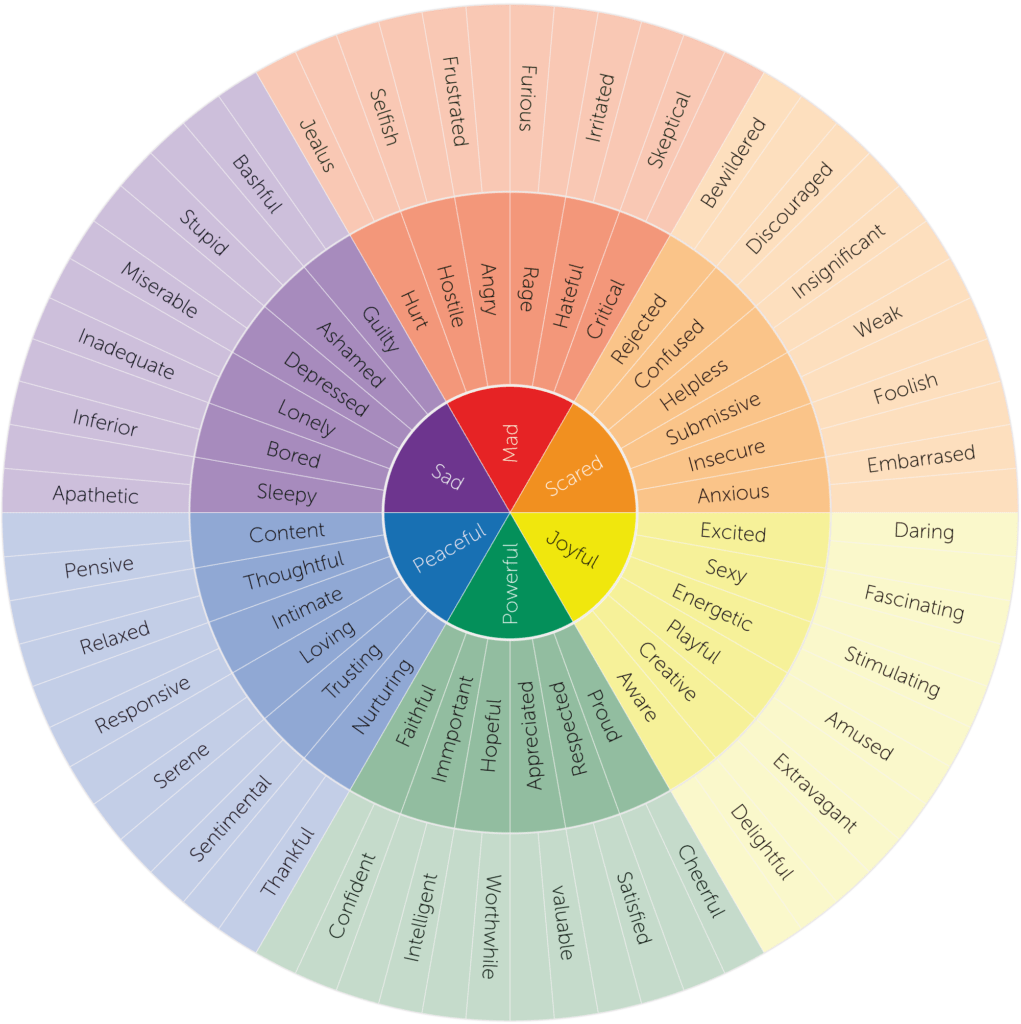What is emotional self-care?
Emotional self-care is to be conscious of and name your feelings, sit with them, feel them in a way that honors you and emotion and builds emotional intelligence through self-reflection.
Emotions will come out in some form 100% of the time. If you sit with them and allow yourself to feel the feels, versus running away or ignoring or suppressing, you are giving yourself the chance to work through the emotion so that you, versus it, are at the controls.

Why is emotional self-care important?
Emotional self-care is critical to enjoying life’s experiences. A healthy mind with well-developed emotional intelligence can experience the same event as a mind struggling with mental health through a more grounded perspective.
Why is that so powerful? Outside events have less power to push your emotions around. Think of the difference between a sapling and a tree when a strong wind blows. The sapling whips all over the place while the tree sways gently back and forth.
We’ve all heard that the mind, body, and spirit are connected. Modern Western tends to prioritize taking care of the body, which is 100% critical. But taking care of the mind is equally important. For someone who has had mental health struggles, I’d argue it’s even more so.
You can be super physically fit or not, you can have no physical disabilities or have a disability – and you can be emotionally fit in any of those scenarios or a complete mess. Regardless of your physical reality, your emotional perspective will dictate whether you are content, satisfied, miserable, or ambivalent.
“How is it that we spend more time taking care of our teeth than we do our minds?”
-Dr. Guy Winch
After you’re done reading, scroll back up and take 15 minutes to watch this super powerful TED Talk by Dr. Guy Winch on practicing emotional first aid. It is worth more than the time it will take to listen to!
What are examples of emotional self-care?
Below are ten simple intentions to practice emotional self-care in your everyday experience:
Create boundaries for yourself
Protecting ourselves from others’ energy is critical for balancing our emotions, especially if that energy is negative or triggering.
Other people may not even realize that their energy or needs affect you.
It can also be hard for friends or family to get used to you creating healthy boundaries for yourself, and they may even take it personally if they’re not used to it. You don’t need to explain yourself, but you certainly can let them know that your boundary doesn’t mean you care about them any less, that it’s about you taking care of your needs.
Say no to being busy
The following quote from Courtney Carver says it perfectly.
I don’t say no because I am so busy. I say no because I don’t want to be busy.
-Courtney Carver
See my post on 365 Quotes for Every Day of Your Bullet Journal for more awesome inspiration!
Saying no to things is a way to protect your time and space. It gives you back time and space to focus on what you want to do with your time. But it also helps you to remember that you have choices.
Just because there’s an expectation for you to do something does not mean you have to.
Work on managing your stress
My husband and I just got home from a hike, and I talked about how stressful my job is (again for the 100th time).
Sometimes, depending on our life circumstances, there will be periods that are more stressful than others. Right now, my job is the most stressful thing in my life, with lots of deadlines, huge expectations, lots of people watching, and plenty of opportunities to make mistakes.
But, I have the choice to leave whenever I want and seek out another job that requires less of my mental and emotional bandwidth.
So, every day that I choose to do the job, I know that is my decision and what I focus on is how to manage the stress better and better wherever I can. It’s not always easy, but small changes make a difference that adds up over time.
Ways that I manage my stress every day are to:
- Delegate tasks where I can
- Making sure I communicate clearly
- Set boundaries on my time
- Listen to my body when it’s sore and tight from sitting all day and moving
- Eat well to fuel myself with health energy and push me forward
- Go easy on myself when I start to lay on the judgy vibes
Create and lean on your support system
If you don’t have a support system in place, that should be top on the list of your self-care needs. My support system includes my therapist, a women’s process group that meets every week, my husband, mom, and some of my closest friends.
Knowing that there are people to reach out to for help when you need it, whether it’s to get together for some laughs or talk through something challenging, gives a sense of confidence that you can handle whatever life throws your way.
Ask your support system for help right when you start to feel overwhelmed.
We all need support at different points, and you’ll probably be able to return the favor sooner than you know.

Stop saying how are you; try saying it’s nice to see you instead
I recently heard Sah D’Simone talking about this, and it resonated. If you haven’t discovered Sah yet, get ready for some positivity and love and just all the goodness. I highly recommend binge-watching his IG feed.
Asking how someone is can feel like a “verbal filler.”
Next time you ask someone how they are, think about whether you want to know how they are. Most of the time, it’s just something we say to fill the space as a nicety. And most of the time, when it’s asked of us, we say okay, or good, or some vanilla answer to return the social gesture. But what if instead, we try saying it’s nice to see you.
Let it be okay to let things be and not over-explain your actions
Sometimes I still struggle with this one, especially in work settings where you’re dealing with power dynamics.
If something you said or did makes you feel like you need to go back and explain yourself, take a breath, let it rest, and take some time to think it through.
This happened to me the other night when I got done with a meeting; I thought something I said offended one of my colleagues. When we got off the video call, I immediately started to text him and ask if anything was off. Then I talked with myself to put the phone down, and it was probably fine, which it was.
Remember, you don’t need to explain anything to anyone else.
Do what you feel is right for yourself at the moment. If you would have made a different decision in retrospect or handled it differently, you will do it next time. That’s how we learn and grow. Every day we have the chance to be a better version of ourselves, for ourselves. Which, by the way, is not a reflection of our value.
Feel your emotions without judgment, shame, or uncertainty
Emotions are beautiful and what makes us human. Just look at how many emotions there are on the “feeling wheel.”

As much as you can, don’t be hard on yourself for how you feel or what you feel. Our experiences shape how we process emotion. Much of what happens around us shapes how we think of ourselves, even though it is not who we are.
We learn as we grow how to feel our emotions, especially those that may have caused us to feel uncomfortable, judge ourselves, feel shameful, guilty, or uncertain in ourselves. All that said, it’s not like there’s a switch that you can flip to be able to start being a master emotion feeler, so take it easy and give yourself the grace and space to learn how to be open to your emotions, whatever they may be.
The feeling wheel is a super useful tool to better understand more accurately what you’re feeling. For example, feelings of sadness can mean different things.
Are you feeling stupid, inadequate, or apathetic?
Once you can zero in on what you’re feeling, you can start to figure out what’s causing it, why it’s making you feel that way, and how you can make shifts to feel better.
Discover how to appreciate your own company
For some of us, this has always been easy, myself included.
I’m an introvert and homebody, so entertaining myself has never been a problem. But I have plenty of friends who find it hard to be alone with themselves.
If you don’t enjoy your own company, why would you expect anyone else to?
Plus, if you learn to be comfortable with yourself when it’s quiet and still think of the feeling of calmness and grounding, that would allow you to feel.
Express your feelings in a safe space and in appropriate ways
It is so essential to express your feelings, especially when something is bothering you, or you can’t quite figure out how you’re feeling. The more you share with others, the better you’ll know who you can share with in different situations.
I think back on when I leaned on friends and family to help me figure out challenging mental health issues. They were happy to support me and try to help, which was everything at the time. But now that I know I can call my therapist and have a weekly group call to share and get feedback, it’s given me a whole new sense of confidence in my self-resolve.
Sharing does wonders to normalize so many things we go through and feel so strongly about. Sometimes the feelings are so powerful; you forget that you’re not the only person on the planet going through life. We’re all out there doing our best!

Determine to forgive yourself
We all need a little more grace these days. Work on giving yourself the permission to make mistakes and not beat yourself up if things don’t go as planned. You are not the same person you were yesterday, never mind the year or five years before. The person who made that decision back then is not the same one in the mirror today. Today, you may make a different decision thanks to the time and experience that has taught you more each day. If you can master self-forgiveness, watch out, world!
Thanks for making it to the end. If this post resonated with you, please stay in touch and watch out for new posts as they come out! If you like this post, check out The Beginner’s Guide to Self-Care in 2021.
